Trump’s expansionist ambitions regarding Greenland are overwhelmingly rejected by both Americans and French citizens
At a time when Donald Trump has confirmed his ambitions toward Canada and Greenland during a recent interview with NBC News, it is clear that his expansionist plans are far from being supported on either side of the Atlantic.
During his visit on Sunday, June 15, Emmanuel Macron will be able to point to strong support from his public on this issue: more than three-quarters of French citizens (77%) reject Donald Trump’s expansionist ambitions toward this autonomous Danish territory, compared to just 5% who support them, and 18% who have no opinion on the matter.
The annexation of Greenland by the United States is therefore supported only marginally in France, with the exception of young people (11% among those under 35) and far-right sympathizers (e.g., 10% of RN supporters).

While a majority of French people reject President Trump’s expansionist ambitions, he also lacks support from his own public: fewer than one in four Americans approve of his idea to annex Greenland (22% support it, while 56% oppose it), and the same goes for the idea of annexing Canada — only 19% approve, compared to 66% who disapprove.
And the new U.S. president is far from being backed by his own party: only a quarter of Republicans support the annexation of Canada (28%), and similarly, the annexation of Greenland (38%).
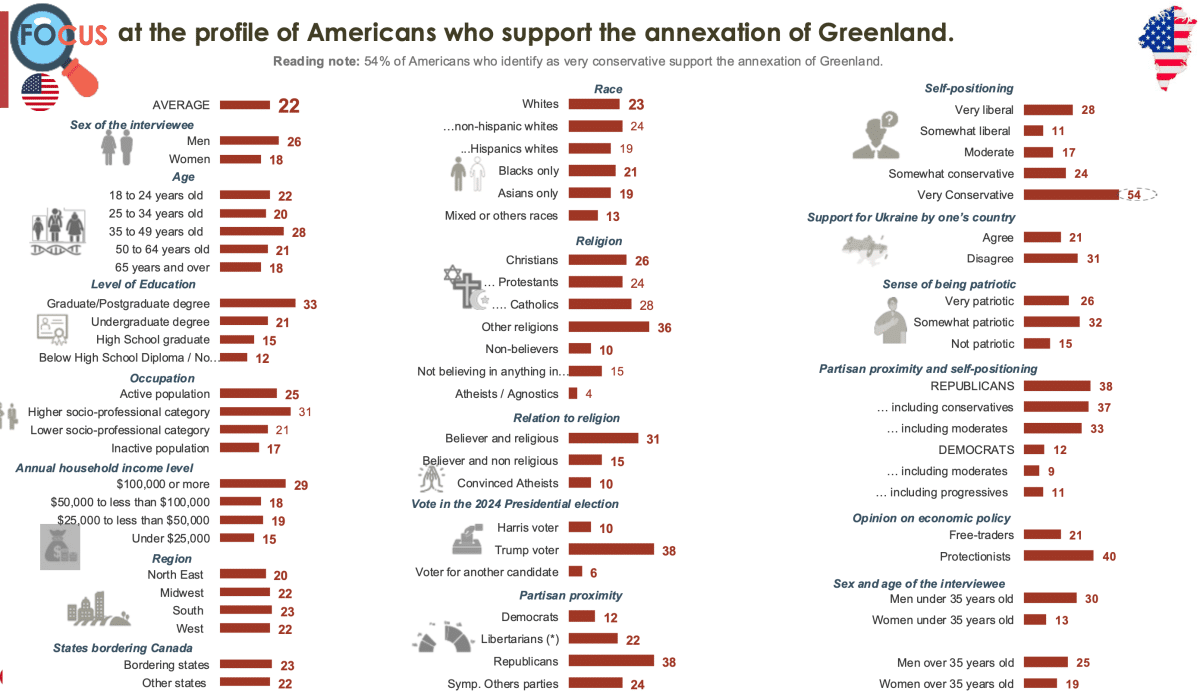
However, these plans highlight divisions that are very reminiscent of those observed during the last presidential election.
In fact, these annexation projects highlight not only a gender gap – such as the annexation of Greenland supported by 26% of men compared to 18% of women – but also a very clear gender divide among young people: men under 35 (33%) are twice as likely to support annexing Canada as women of the same age (15%).
The view of Ifop’s François Kraus
In the light of these results, Donald Trump’s expansionist ambitions in North America appear to be very far removed from the expectations of his constituents: Trump’s imperialism remains a fringe view outside of conservatives and young men. It is difficult not to see in this territorial expansionism the expression of a “youthful masculism” among young men, as a way to channel aggressive and dominant impulses they may struggle to express in real life. In any case, the fact that these imperialist ideas resonate particularly with frequent gamers confirms the specific profile of their supporters.
Broad opposition from the French
While a majority of Americans reject their President’s expansionist ambitions, opposition is even stronger among the French, reaching exceptionally high levels: 78% oppose the annexation of Canada, 77% oppose the annexation of Greenland and 75% oppose the US takeover of the Panama Canal, reflecting an overwhelming consensus. For example, the annexation of Canada by the USA is supported by only 5% of French people, with a peak of 9% among Lepéniste voters.
An even stronger rejection of the use of force, including for the Panama Canal
While the Trump administration has ruled out the use of force to annex its Canadian neighbour, what do Americans and the French think about the potential use of armed forces to take control of territories such as Greenland or the Panama Canal?
American public opinion appears to be even more resistant to Trump’s expansionist agenda if it is achieved through military or economic pressure.
Indeed, a large majority of Americans say they are opposed to the idea of using economic pressure to annex Canada (68%) or military force to annex Greenland (70%).
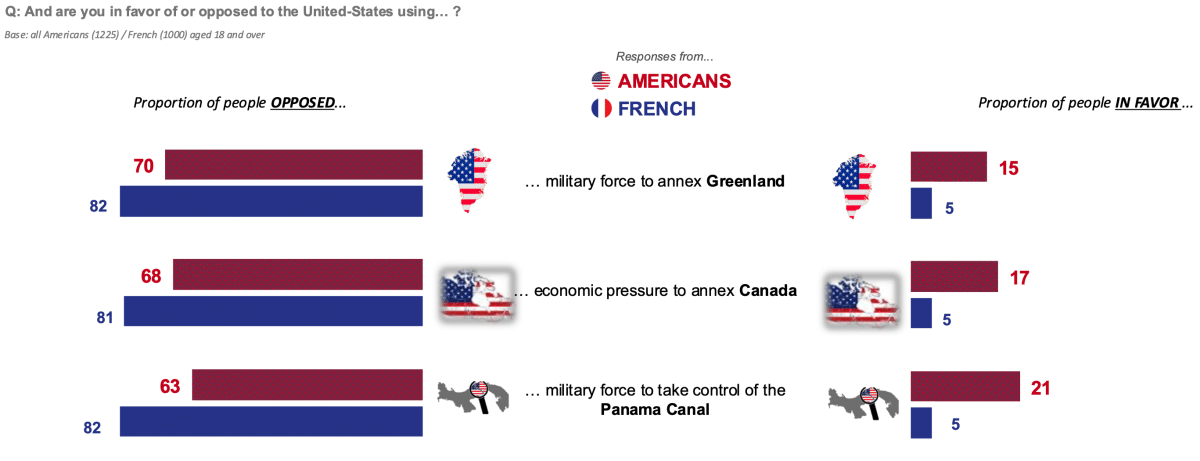
Similarly, while in principle the idea of taking control of the Panama Canal is less unpopular than annexing Canada (35% of Americans approve, compared with 48% who disapprove), repeating a military operation like the 1989 invasion of the country is not at all popular. Only a minority of Americans are in favour (21%), including among Republicans (33%).
Almost unanimous opposition from the French
Opposition to the use of military or economic pressure to achieve these annexations is even stronger among the French, exceeding the 80% threshold: 81% of French people are opposed to the annexation of Canada, 82% to the annexation of Greenland and 82% to the United States taking control of the Panama Canal.
French opposition to US imperialist plans is strong enough to potentially justify a military response from France
At a time when we are celebrating the victory of the Allies over another imperialism, the German imperialism of the 1930s, it may also be interesting to know how far French opposition to Trumpian imperialism can go, particularly if it affects Nato members such as Canada or countries associated with the European Union such as Greenland.
French opposition to Trump’s imperialist plans is strong enough that many support French military intervention to counter them.
For example, more than four out of ten French people (44%) believe that France should prevent the annexation of Canada by the United States “if necessary by force”, a proportion similar (43%) to that seen in the case of the annexation of Greenland (44%). Panama, being culturally more distant, elicits less empathy, as shown by the lower proportion of French people (34%) prepared to prevent “by force” the takeover of its canal.
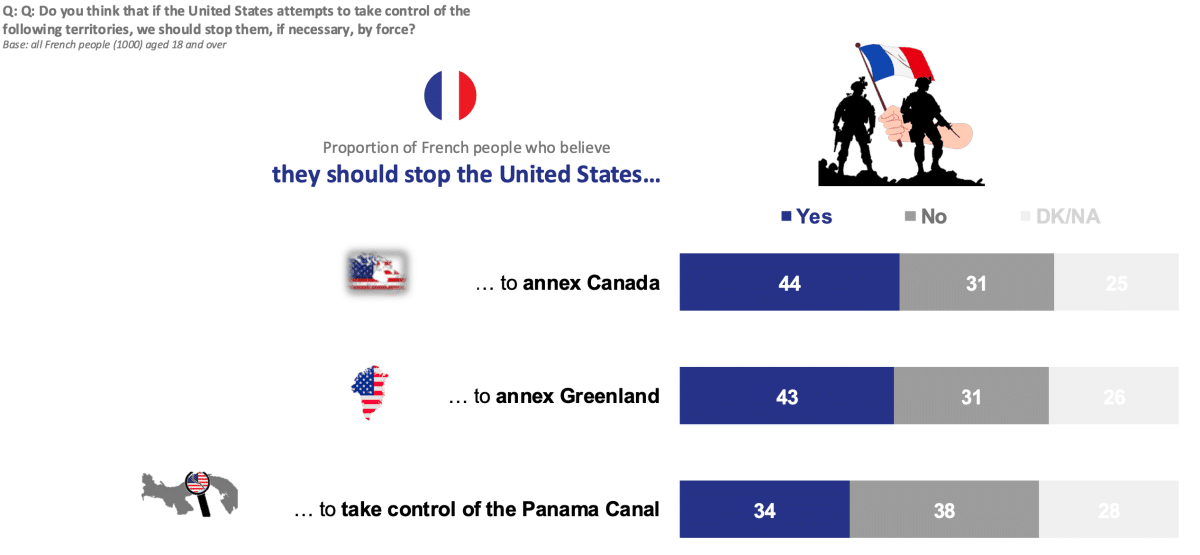
A little more than 80 years apart, a comparison of the responses of the French with those measured by Ifop in 1939 in response to the Nazi plan to annex the Danzig corridor – a plan that triggered the Second World War – nevertheless shows that the level of concern among the French today is not comparable: half as many French people (43%) support preventing the U.S. from annexing Greenland by force today, compared to 76% who supported stopping Germany from taking Danzig in June 1939 [1].
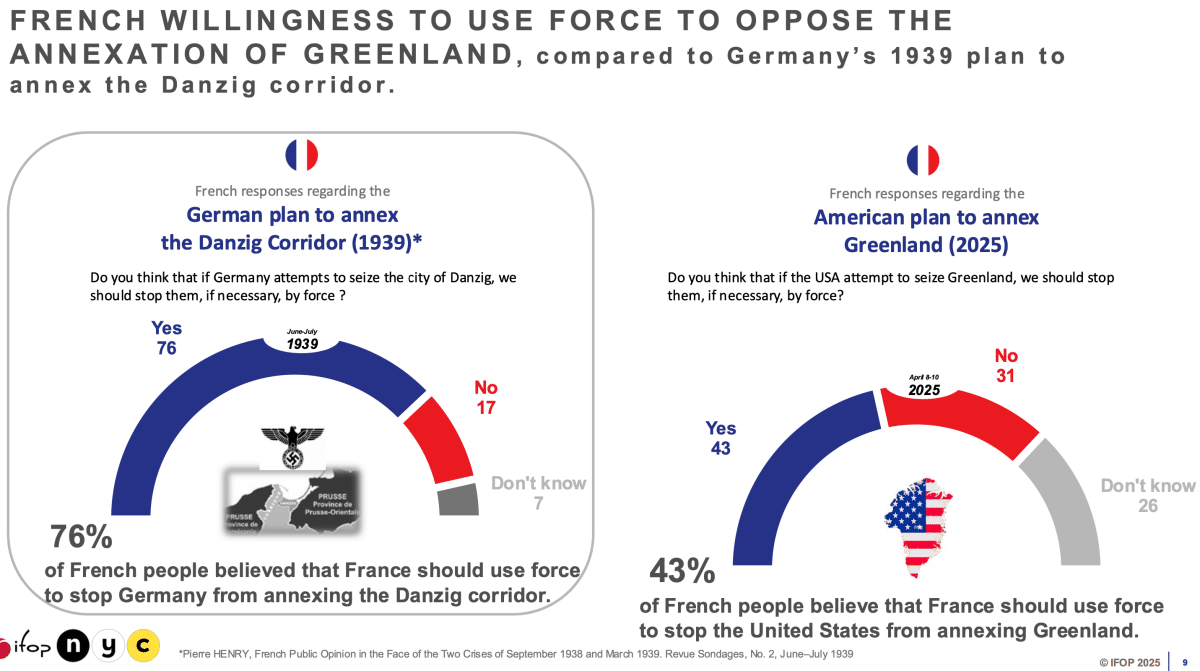
[1] Pierre HENRY, “French Public Opinion in the Face of the Two Crises of September 1938 and March 1939.” Sondages Review, No. 2, June–July 1939.
It is true that the American threat is undoubtedly perceived as less vital by the French, especially as it concerns territories thousands of kilometres from France.
An analysis of the political profile of supporters of military opposition to American imperialist plans reveals a striking historical constant: as in 1939 in the face of Nazi expansionist plans, it is on the far right that we find the greatest reluctance to defend international law militarily against expansionist threats: only 32% of RN supporters are in favour of French military intervention against the annexation of Canada, compared with 65% of LFI supporters and 78% of Renaissance supporters.
Back in 1939, it was Marcel Déat, a neo-socialist and future figure of the collaboration movement, who refused to react to Nazi imperialism in his famous column “Faut-il mourir pour Dantzig?”(L’Œuvre, 2 May 1939).
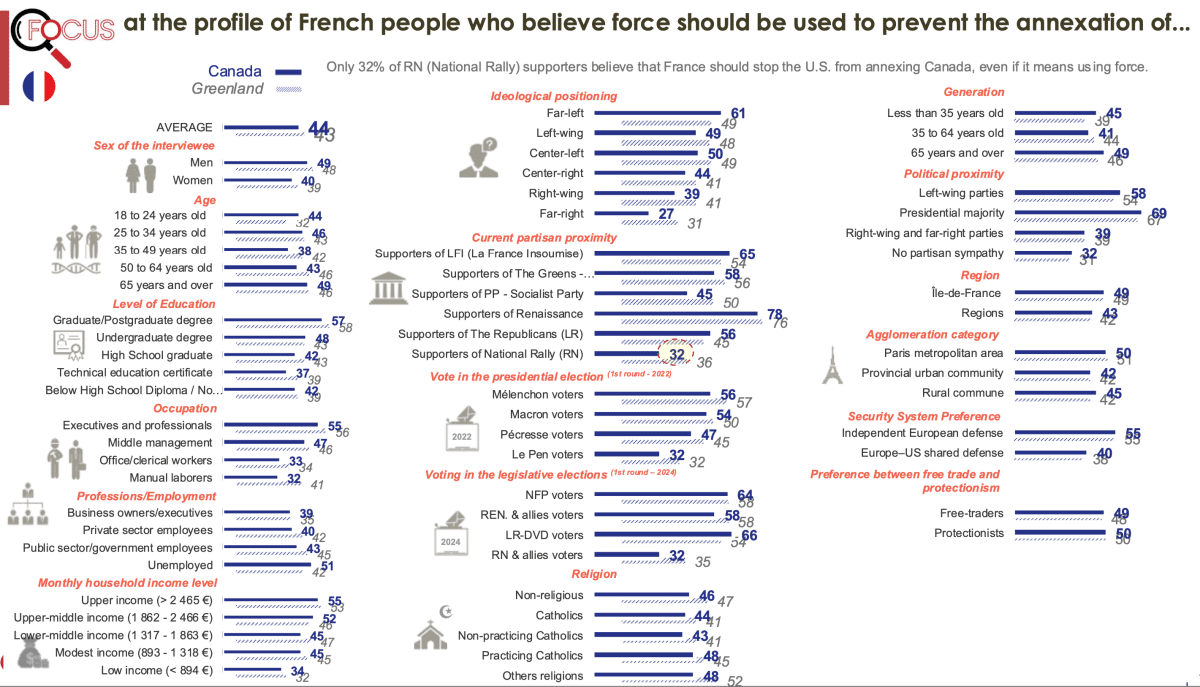
To cite this study, please use at least the following wording:
“Ifop survey for NYC.eu carried out by online self-administered questionnaire among a nationally representative sample of 1,225 Americans aged 18 and over (8-10 April 2025), and a nationally representative sample of 1,000 French people aged 18 and over (9-10 April 2025). For comparison purposes, a probability sample of this size would have a margin of error of no more than ±3% (19 times out of 20).“

